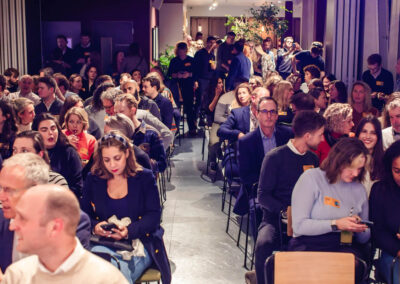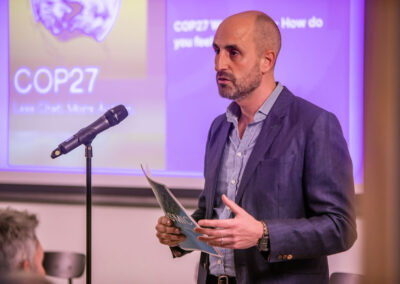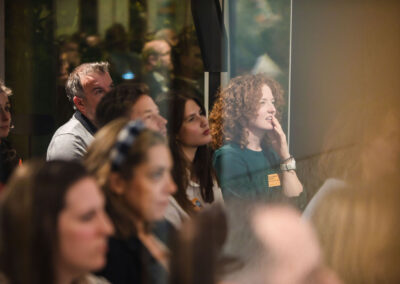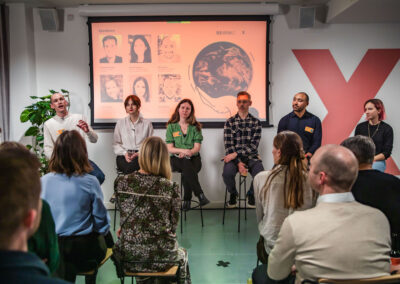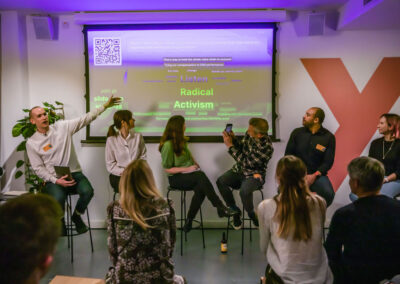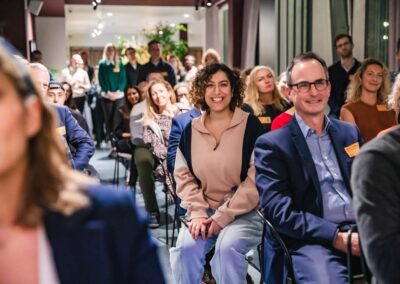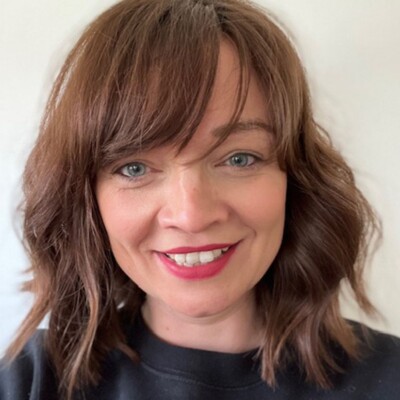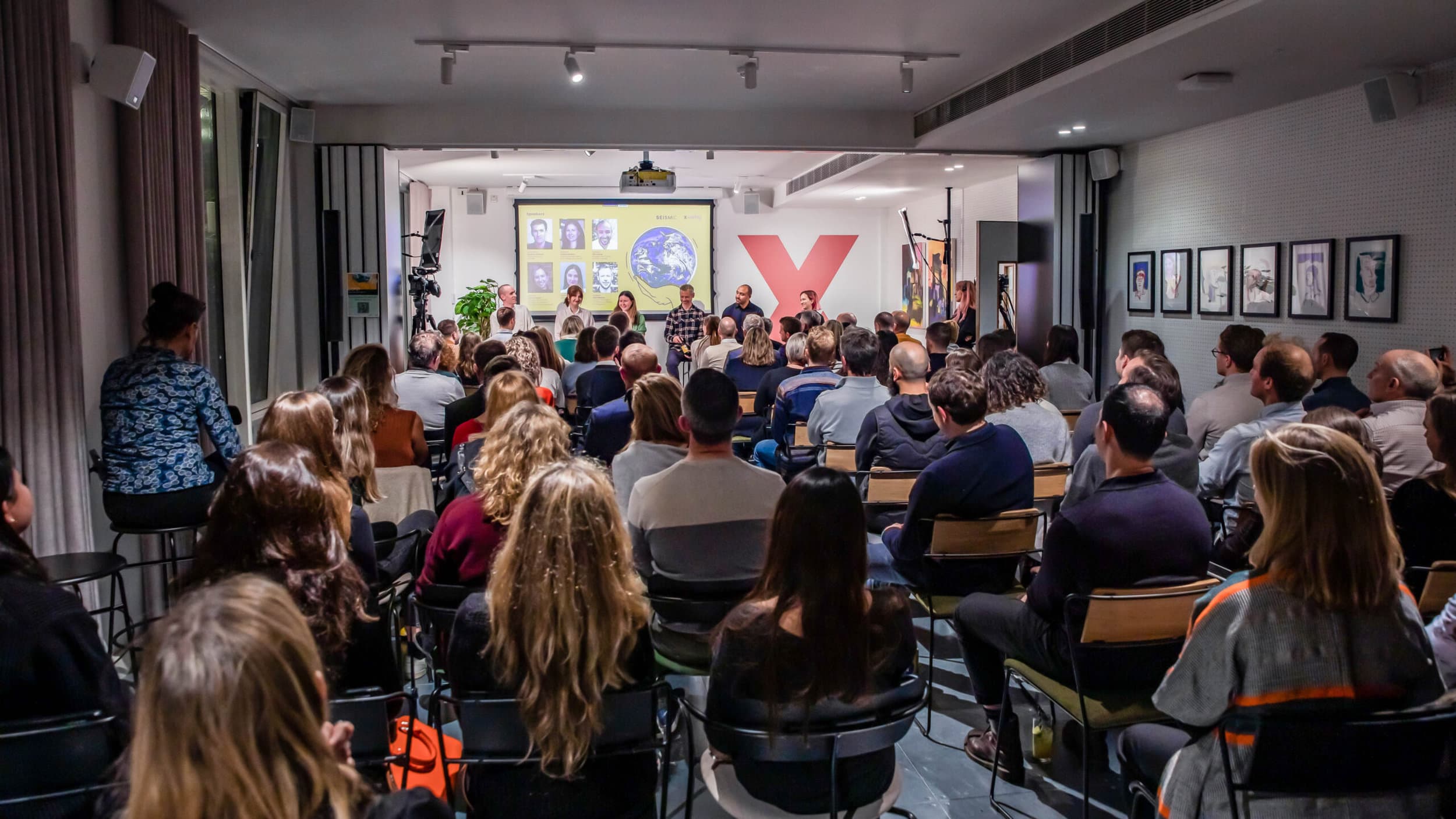
On 15th November 2022, whilst being live-streamed to our international audience, Seismic and x+why joined forces to help our networks celebrate and connect with this year’s COP27 conference ‘Together for implementation’.
Guests came together to hear from leading industry speakers on how to create actionable change, exploring how businesses have the power to create societal and environmental impact.
Our panel discussion brought to the surface a focus on the severe and immediate impacts of climate change on southern global countries. On how businesses can make a change through governance and how to rally individuals to become more considered and active in working with the climate crisis. The whole event brought an opportunity to get the Seismic community motivated and pledge to make changes in their own businesses.
The panel
- Richard JohnsonModerator, Head of Impact at B Corp period brand DAME, and Mission Ambassador at x+why.
- Amy BourbeauCofounder and Chief impact officer of Seismic
- Louise HarmanPartner at Bates Wells and Trustee of B Lab UK
- Alex BeasleyCountry Manager for UK, Ireland & Nordics at Patagonia
- Will JamesFounder and Coach at With Diversity, a coaching consultancy
- Clover HoganClimate Activist, Founder & Executive Director at Force of Nature
Setting the scene
Paul Lewis, CEO – Seismic, opened the event by discussing the importance of ambition and emphasising the event’s title, Less Chat, More Action! What binds the Seismic community is the common belief that business can be used as a force for good.
Paul, talked of the despair many are feeling about the climate crisis, and how by the end of the century there could be up to one billion climate refugees. However, he appreciates that although this is a challenging time, Seismic remains optimistic.
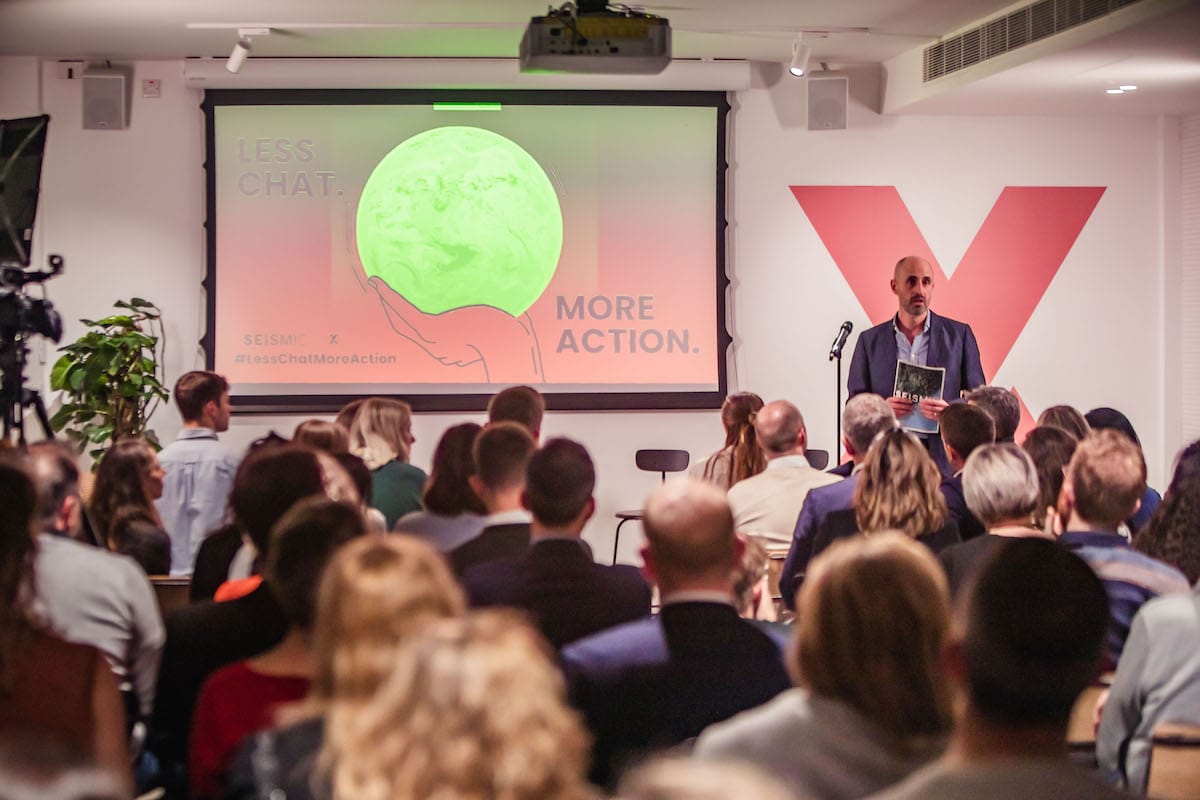
The teaser of an incredibly powerful film was shown and discussed, with a bespoke piece to the camera from one of the directors, Deej Phillips. The Weight of Water: The Human Cost of Climate Crisis, by Deej Phillips and Neelima Vallangi, is a documentary based on a collective of people in Nepal and the consequence annual flooding is having on their community. Putting some of their land underwater, impacting horticulture, income, human health, and lives – as people drown in the unpredictable floods. Deej wants to create meaningful climate action. “We all have the power to shift the climate action dial”.
Paul finished by sharing that he remains optimistic, firmly hopeful that we will get out of this crisis. Not because of political leaders, but because of the small and medium-sized businesses and their leaders, who are making a change and are passionate about changing what they can control.
The impact of the B Corps
Amy Bourbeau shared with pride that there are now over 1,000 B Corps in the UK and 6,000 globally. A business has to be taking climate action to qualify as a B Corp and it shouldn’t stop with the certification. If B Corps want to continue to improve, they need to focus on operational changes that can be made to impact their businesses and environment. There are a wealth of amazing resources on B Lab UK.
“We don’t need to wait to be told that the climate is important. We’ve got the tools between us so we should have no reason to not be acting now. Great B Corps should be ahead of the curve.” Amy Bourbeau.
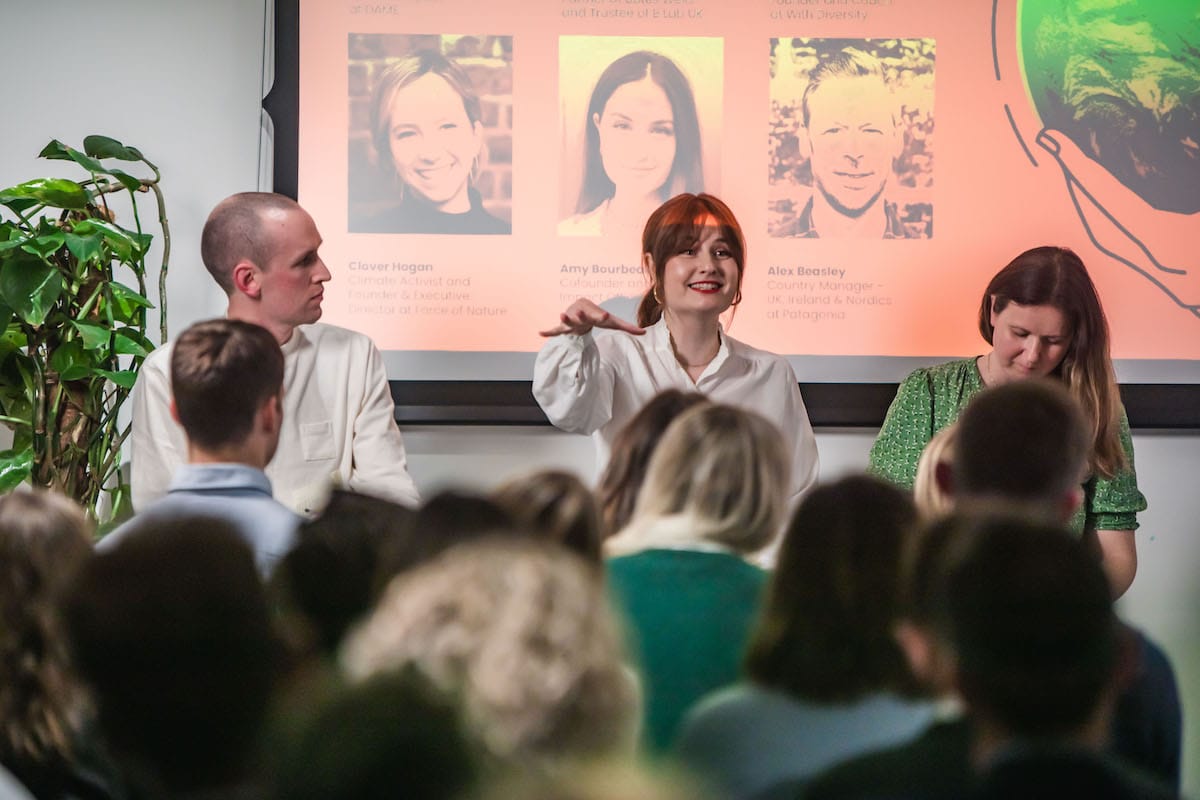
Never stop setting a good example
“B Corps need to set a standard of behaviour as an example to all those they come into contact with.” Louise Harman
Companies need to consider their behaviour from an organisational level, all the way down to the clients they do business. All organisations should take responsibility to look at the bigger picture. Client emissions are as big a consideration as our own. Influencing clients, to do better and nudging their behaviour means going beyond what is easy and working on a larger remit of change for good.
Bates Wells stands by being a law firm that is a ‘force for good’ and understands the biggest impact it can have is by affecting the emissions its clients make. This is a model that can easily be mapped onto accounting firms/ad agencies/etc. Louise explained that if you only take on clients who are trying to do better by the environment, the conversation changes… people, and businesses, have to consider their own impact otherwise they may not be welcome to work together.
Become a mighty lion
Will James wants everyone to be courageous – “We need to keep the faith with the people we’re in the room with. We can get through any discomfort if we’re holding that process.”
“Partnerships are essential, engage with others. We need to stay connected to ‘hope’. And we all need purpose. We must not resist change, if we can connect with purpose we’ll take action. Looking at the brutal facts and finding our purpose can lead to innovation.”
Practically that means implementing systems and processes that are ready for change. It isn’t easy for organisations to get from intention to impact, so the systems are important. Individuals can come into businesses and try to shake things up, but they will be spat out without a vision. Systems are needed to connect things and justify purpose. Will said to get an honest vision of progress requires diverse voices, underrepresented voices and the voice of the planet all being represented at the table. It’s about progress, not perfection. Only then will organisations be able to meaningfully take a step forward. It might be unpleasant to hear, but prepare people and get them to commit to engaging with other perspectives.
The power of choice
“As citizens, we have a choice over how we spend our money, who we spend it with and when and that impacts big business. We can make a change with more conscious consumer spending and decisions. We need new narratives to aim for.” Alex Beasley.
Businesses need to catch up with the sense of hopelessness and take agency from events like this. Patagonia is a company that says it’s now in the service industry. They’ve changed their mission to ‘We’re in the business to save our home planet, so let’s get on with it!’ Alex proudly conveyed “Every penny we make is split between Patagonia and combating the climate crisis. Everything’s changing for us, fair trade choices, how we source and make our products, transportation, delivering on our B Corp governance… we just keep trying to deliver back”.
In the UK Patagonia wants to make an impact by working with small local groups to really make an impact. They now source energy from an NGO called Energy Garden, which produces energy through solar panels. They’re bringing biodiversity to the tube stations in London and developing local communities through housing projects and supporting young people to gain a better chance at life.
This is not business as usual
Clover Hogan has been an activist since she was 11 years old and working since she was 17. All she wanted was to fit in but quickly realised that it was only disruption that would make an impact. The ‘business as usual’ thinking was not getting the planet anywhere. She embraced being a young person in this space and shared the metaphor that ‘The wings of her imagination and radical thinking abilities are still intact’, so, essentially she was the right person, in the right space to shake things up. Clover recognised the need and worked to become a voice of society that hadn’t yet had a voice. By bringing diverse voices together to take governance over their own future more people will benefit.
When asked if the youth has lost faith? Clover said, “My first COP conference was COP21, at 16 years old, I turned up with huge optimism, thinking ‘finally I’m going to have a conversation with the adults at the table”. But she was quickly disheartened as she found out the event was sponsored by the likes of BMW, Coca Cola and Shell, who are all fluent in greenwashing, did not want action, and were there to fulfil their own agendas. “I felt hopeless and in despair. Last year at COP26 I turned to look at the millions of people who were self-organised and making noise outside boardrooms/institutions seeking an equitable future and had my faith restored… We need radically new ways to engage and create change, take on the risk/challenge of civil disobedience and use the law to sue oil and gas companies. These people, creating disruption, are some of the bravest people out there.”
Through people like Clover and Forces of Nature, those who don’t usually get heard or are marginalised as token voices, are coming face-to-face with decision-makers and are getting involved in the decision-making process.
Takeaways
Amy spoke powerfully about being part of the solution. “One of the main things is the cognitive dissonance between knowing that our collective house is on fire and not responding to that with the urgency it requires. Businesses need to stop seeing this as just a moralistic thing, it’s risk mitigation. Investing in climate action is necessary, it’s not going away. Over 70% of economic sectors are directly impacted by climate issues – e.g. weather/supply chains/workers/crop failures. We need to stop those things from happening. If not for moralistic reasons, change to help your business.”
The principles of B Corps are around duties, transparency and accountability to provide a solid foundation behind the change. Louise emphasised that there are no non-radical options left.
Alex’s main piece of advice is to get comfortable getting political. Break things down at a local level, and find campaigns and movements that mean something to you. Support their actions. In order to make a difference start locally and engage your team to bring focus and action.
Will reiterated that humans are inherently resourceful and full of potential. We don’t have to rely on the Government. Concentrate on what’s within your control. Is your business unified on what compelling purpose there is that needs to be achieved? Dream bigger, start smaller. If you start to see progress in something tiny it’s always a motivator.
Clover emotionally shared that it is too late for so many climate refugees – 33 million people in Pakistan have lost their homes, 1.5 million in Nigeria haven’t even made the headlines. In the pursuit of greed, and staying in a bubble of privilege, a lot of people don’t want to see how bad things are.
She said, “It’s hard to hold onto hope sometimes as I don’t see society acting. Profit is driving action, instead of safeguarding people who are being hurt by the climate crisis. We’ve not failed because of money, ingenuity or ability, we lack political will.
“Every year 10 million people die due to air pollution, poor people, people in the global south who don’t have a voice, and so nothing’s changing. We must keep showing up. We can’t be defeated. There is no alternative but to show up and make choices every single day to do better.
“It’s not about hope, it’s about do or die.”
If you’d like to see the recording of the event, follow this link.

